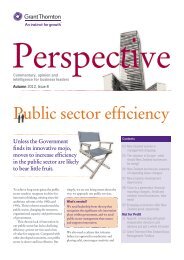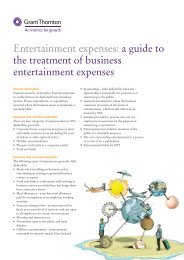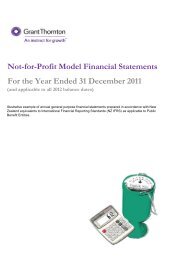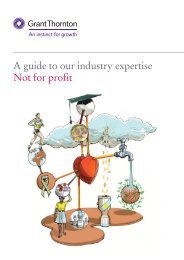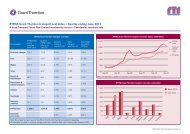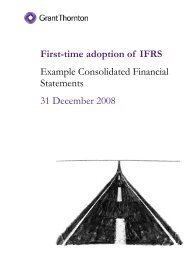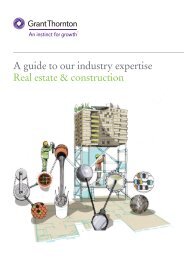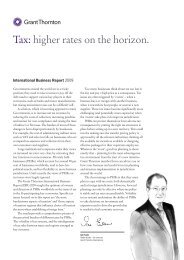Preparing for global lease accounting standards - Grant Thornton ...
Preparing for global lease accounting standards - Grant Thornton ...
Preparing for global lease accounting standards - Grant Thornton ...
You also want an ePaper? Increase the reach of your titles
YUMPU automatically turns print PDFs into web optimized ePapers that Google loves.
Most believe that the<br />
rigorously detailed<br />
<strong>standards</strong> (as they<br />
currently exist) will at<br />
least achieve a goal of<br />
transparency and make<br />
trying to tilt the playing<br />
field difficult or of<br />
limited value.<br />
rather than on business model changes.<br />
Philip Payne, CEO of Charlotte,<br />
N.C.-based Ginkgo Residential, a real<br />
estate operating company that provides<br />
management <strong>for</strong> 28,500 apartment<br />
homes across the United States,<br />
said he does not expect major impact<br />
“other than significant increase in<br />
<strong>accounting</strong> ef<strong>for</strong>t and cost with<br />
no benefit. [The] proposal will<br />
not result in more accurate or<br />
in<strong>for</strong>mative financials. [It] in fact<br />
may be misleading.”<br />
“I think, long term, just the pure<br />
cost of having to implement something<br />
as complex as this standard in the<br />
type of economic environment<br />
we’re in is un<strong>for</strong>tunate timing,”<br />
said Bradshaw from AAC.<br />
Sandro D’Ercole, VP <strong>accounting</strong>,<br />
Redcliff Realty Management Inc., a<br />
Toronto-based real estate company<br />
providing asset management, property<br />
management, and development services<br />
to private investors and pension funds,<br />
reiterated that comment: “This will lead<br />
to more subjective interpretations of the<br />
financial statements and questions by<br />
our stakeholders.”<br />
Angus Harvey Ross is senior<br />
director at CB Richard Ellis, Brisbane,<br />
Australia, which is a service provider<br />
in the corporate real estate area,<br />
providing advice and services to major<br />
corporations that occupy space<br />
rather than those who invest in the<br />
development of space: “I think it’ll have<br />
a substantial impact in both my business<br />
and in the business of my clients. We’re<br />
already seeing the commencement of<br />
it now. I think we’re probably a little<br />
bit too late in the process, but we’re<br />
starting to see much more emphasis<br />
being brought on to the changes that<br />
will take place and how that will affect<br />
the portfolios and the balance sheet.”<br />
Executives believe there will be<br />
little room to manipulate or develop<br />
<strong>accounting</strong> structures to improve<br />
competitive position or gain advantage<br />
via the <strong>standards</strong>, such as providing<br />
the appearance of enhanced cash flow.<br />
Most believe that the rigorously detailed<br />
<strong>standards</strong> (as they currently exist) will<br />
at least achieve a goal of transparency<br />
and make trying to tilt the playing field<br />
difficult or of limited value.<br />
“There may be opportunity to<br />
structure <strong>lease</strong>s in such a way to give<br />
favourable <strong>accounting</strong> positions<br />
through varying incentives, <strong>lease</strong><br />
structures, or <strong>lease</strong> review profiles,<br />
however we have not fully investigated<br />
these at this time as all outcomes<br />
associated with the new standard are<br />
still not known,” said an Australian<br />
executive. “We expect these opportunities<br />
to be limited as we assume the final<br />
standard will focus on the substance<br />
of the transaction.”<br />
“From what I’ve read of the<br />
standard, it’s fairly well written,”<br />
said Bradshaw. “When I say well<br />
written, [I mean] it doesn’t lend itself<br />
to manipulation very well from what<br />
I can tell. Unlike most of the <strong>standards</strong><br />
we’ve had hereto<strong>for</strong>e in the US, it’s<br />
a principle-based standard and not a<br />
rules-based standard. When you have<br />
a principle-based standard, it’s very<br />
difficult to manipulate the process to<br />
your benefit. So I don’t think there’s<br />
a lot of room, at least in the way the<br />
standard’s written now, <strong>for</strong> landlords to<br />
develop a programme where tenants get<br />
a favourable treatment on their balance<br />
sheet by some structuring mechanism.<br />
Maybe there will be, but I haven’t<br />
seen it yet.”<br />
Sumit Chatterjee, GCFO, Pioneer<br />
Urban, a real estate development firm<br />
headquartered in Gurgaon, India,<br />
near New Delhi, remarked,<br />
“The objective of this standard is<br />
to have a more transparent <strong>accounting</strong><br />
structure. We believe that the<br />
companies in the leasing business<br />
will surely develop a leasing structure<br />
that complies with IAS along with<br />
maintaining cash flows and financial<br />
positions of both lessor and the lessee.”<br />
Lease lengths and incentives<br />
Executives in the real estate sector<br />
are concerned about the effect of<br />
pending <strong>standards</strong> on markets just now<br />
emerging from recession. One concern<br />
is that if <strong>lease</strong>s are accounted <strong>for</strong> by<br />
lessees as liabilities <strong>for</strong> the length of<br />
the <strong>lease</strong>s (and possibly including<br />
options <strong>for</strong> additional years), will<br />
lessees seek shorter-term <strong>lease</strong>s?<br />
And if that occurs, how might it<br />
impact valuation of lessor properties?<br />
Persky argues that companies are<br />
already seeking short <strong>lease</strong>s and earlier<br />
breaks, and that the new <strong>standards</strong> will<br />
put even more pressure on them to<br />
negotiate shorter terms. “We’ve got<br />
existing, very long <strong>lease</strong>s. I don’t know<br />
what’s going to happen next time we<br />
do a major deal. I guess there’ll be<br />
pressure about whether it affects<br />
valuation and how it will affect the<br />
amount of debt that can be raised at<br />
one time on the deal.”<br />
An Australian real estate executive<br />
also anticipated shorter <strong>lease</strong> lengths.<br />
“We believe that in the short term<br />
that covenants will be altered to<br />
accommodate the change, and this<br />
impact on businesses will be highlighted<br />
as a detailed note in the accounts.<br />
The medium- to long-term [time frame]<br />
could lead to shorter <strong>lease</strong> terms or<br />
alternate methods of contracting to<br />
minimise balance-sheet impact.<br />
This would potentially impact our<br />
non-residential business model.”<br />
Others argue that most tenants<br />
need to be able to project their<br />
occupancy costs and want to<br />
minimise <strong>lease</strong> cash costs, which would<br />
mean lessees won’t necessarily seek<br />
shorter <strong>lease</strong> terms. Garfield said,<br />
“If they’re retail, they certainly don’t<br />
want to be exposed to market rifts.<br />
In major shopping centres, those are<br />
typically 10-year <strong>lease</strong>s, and they’re<br />
not going to want to go to two- or<br />
three-year <strong>lease</strong>s and then be exposed<br />
to market conditions just <strong>for</strong> <strong>accounting</strong><br />
issues; same thing with office tenants.”<br />
“Inevitably the likely reaction<br />
will be different <strong>for</strong> different types of<br />
tenants,” said Bell of the UK’s British<br />
Land Co. “Our portfolio is prime, and<br />
we find that the retail occupiers often<br />
want long <strong>lease</strong>s to be assured of having<br />
a unit on a key trading area. There will<br />
be other tenants with a different view.<br />
If <strong>lease</strong>s were to be shorter, the impact<br />
on valuation will be a function of<br />
the market: in a strong market it may<br />
have little impact; in a market craving<br />
certainty, then depending on the level<br />
of the rents, it may be seen as a<br />
disadvantage. However, this standard<br />
has been on the agenda <strong>for</strong> the last<br />
decade and has not significantly altered<br />
tenant behaviour so far.”<br />
“I think sophisticated tenants or<br />
sophisticated lessees will analyse it<br />
correctly and remember why they<br />
wanted a long-term <strong>lease</strong> to start<br />
with,” said Bradshaw. “It’s an inflation<br />
hedge, and so that you can budget<br />
and control your cost. I think that<br />
if [desire <strong>for</strong> short-term <strong>lease</strong>s]<br />
is a phenomenon, I think it’ll be<br />
short-lived, because I don’t<br />
believe most lessees want<br />
significant volatility in their<br />
occupancy costs.”<br />
Harvey Ross of Australia added:<br />
“We’re not seeing people changing<br />
to short-term <strong>lease</strong>s, primarily because<br />
the markets here work on long-term<br />
<strong>lease</strong>s and the benefits and incentives are<br />
<strong>for</strong> long-term <strong>lease</strong>s. So, it’s unlikely that<br />
we’ll see too much short-term work.<br />
The major issue <strong>for</strong> these companies<br />
is that the initial impact, in other words<br />
the data changeover, means that every<br />
<strong>lease</strong> becomes a capital <strong>lease</strong> irrespective<br />
of its [term]. What the auditor is<br />
assigned to look at now is the spread<br />
of the expiry dates over a 10-year period<br />
so that if it’s better now to renegotiate<br />
the <strong>lease</strong>s to get a better spread of<br />
expiries, then we’re renegotiating the<br />
<strong>lease</strong>s prior to the impact of the new<br />
<strong>accounting</strong> <strong>standards</strong>.”<br />
8 9



